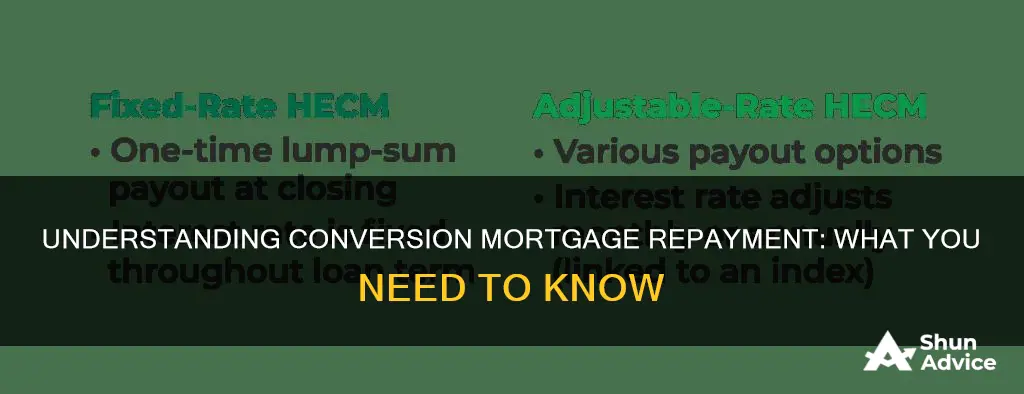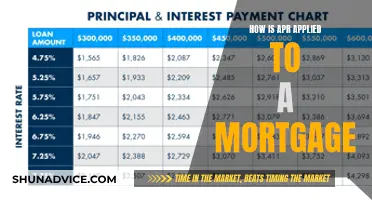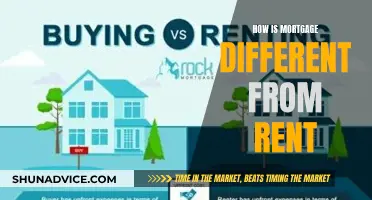
A Home Equity Conversion Mortgage (HECM) is a type of reverse mortgage that allows older borrowers to tap into the equity in their homes without making monthly payments. Instead, the loan is repaid in full when the borrower dies, sells the home, or moves out permanently. This type of mortgage is designed for homeowners aged 62 and older, allowing them to borrow money using their home as security. While it offers flexibility in terms of monthly payments, interest and fees are added to the loan balance, and borrowers are responsible for maintaining the property, paying property taxes, and keeping it insured. Understanding the repayment triggers and options is crucial for borrowers and their families to plan effectively and avoid surprises.
How is a Conversion Mortgage Paid Back?
| Characteristics | Values |
|---|---|
| Type of Mortgage | Home Equity Conversion Mortgage (HECM) |
| Applicability | For homeowners aged 62 and older |
| Monthly Payments | No monthly payments |
| Repayment Trigger | When the borrower dies, moves out of the home, or stops fulfilling the terms of the agreement |
| Repayment Options | Selling the property, refinancing, borrowing, using savings, or selling assets |
| Right of Rescission | Yes, within three business days after the loan is closed |
| Lender | Backed by the Federal Housing Administration (FHA) and issued by an FHA-approved lender |
What You'll Learn
- Reverse mortgages are paid back when the borrower dies
- Or when the borrower moves out of the home
- Or if the borrower stops fulfilling the terms of the agreement
- The borrower's heirs may sell the home to pay off the reverse mortgage
- Or they can pay off the reverse mortgage by taking out a new mortgage on the property

Reverse mortgages are paid back when the borrower dies
Reverse mortgages are typically paid back when the last surviving borrower passes away. The loan must be paid in full, usually by selling the home. However, there are a few exceptions and alternative options to consider.
Firstly, if there is a co-borrower on the loan, such as a spouse, they can remain in the home and continue to receive loan payments as long as they fulfil the loan obligations. In this case, the loan does not need to be repaid until the co-borrower also passes away or moves out.
For non-borrowing spouses, there may be a possibility to remain in the home without immediate repayment of the loan. Under certain conditions, a non-borrowing spouse may qualify as an Eligible Non-Borrowing Spouse under U.S. Department of Housing and Urban Development (HUD) rules. This typically requires that the spouse was married to the borrower at the time the loan documents were signed and remains married until the borrower's death. The lender will perform an annual certification to confirm the eligibility of the non-borrowing spouse.
If the borrower's heirs or relatives wish to keep the home, they have a few options for repayment. They can sell the home and use the proceeds to pay off the loan, keeping any remaining profits. Alternatively, they can take out a new mortgage or pay cash to retain the property. The heirs may also choose to refinance the loan or consult a professional about creating an estate plan.
It is important to note that reverse mortgages can impact the benefits received from need-based government programs, such as Supplemental Security Income (SSI). Additionally, failure to abide by the loan conditions, such as using the home as the primary residence, maintaining the property, and paying associated fees, can result in foreclosure.
The Cost of Borrowing: $2 on a $400,000 Mortgage
You may want to see also

Or when the borrower moves out of the home
A Home Equity Conversion Mortgage (HECM) is a type of reverse mortgage that is backed by the federal government through the U.S. Department of Housing and Urban Development (HUD) and the Federal Housing Administration (FHA). It is the most common type of reverse mortgage and is available only to homeowners aged 62 and older.
Unlike traditional mortgages, HECM borrowers do not make monthly mortgage payments. Instead, interest and fees are added to the loan balance each month, and the balance grows. The loan is then repaid when the borrower no longer lives in the home.
If the borrower moves out of the home, the loan becomes due and payable. Generally, 12 consecutive months of non-occupancy is considered a permanent move, and the loan must be repaid in full. This can be done through a variety of methods, including:
- Selling the property: The proceeds from the sale are typically used to repay the loan balance, with any remaining equity going to the borrower or their heirs.
- Deed in lieu of foreclosure: Heirs can hand over the property to the lender to satisfy the loan without going through a formal foreclosure process.
- Refinancing: The borrower or their heirs can take out a new mortgage on the property or switch to a conventional loan, returning to making monthly mortgage payments.
- Borrowing: Taking out a personal loan or using savings to pay off the reverse mortgage balance.
- Using other assets: Borrowers or their heirs can sell personal possessions or other property to repay the loan.
It is important to carefully review the terms of the loan agreement to understand the specific requirements and options for repayment.
Mortgage Reserves: Critical for Home Loan Approval and Peace
You may want to see also

Or if the borrower stops fulfilling the terms of the agreement
If the borrower stops fulfilling the terms of the agreement, the reverse mortgage loan becomes due and payable. This can occur in several ways, including:
Non-payment of property taxes, hazard insurance, or other obligations
The borrower is typically required to pay property taxes and maintain homeowners insurance. Failure to do so can trigger early loan repayment.
Permanent move or relocation
A reverse mortgage requires the borrower to maintain the property as their principal residence. If the borrower moves out permanently, such as to a long-term care facility or another residence, the loan becomes due. Generally, 12 consecutive months of non-occupancy is considered a permanent move.
Failure to maintain the property
The borrower is expected to keep the property in good condition and make necessary repairs. Allowing the property to deteriorate can result in the loan becoming due and payable.
Death of the borrower
When the borrower passes away, the reverse mortgage must be repaid in full. The lender recovers the money advanced, plus interest, when the home is sold. If the home is sold for more than is owed, the remaining equity goes to the borrower's heirs.
Refinancing or borrowing
Borrowers or their heirs may choose to refinance or take out a new mortgage on the property to repay the reverse mortgage and retain ownership of the home. This option may involve closing costs and requires meeting specific credit score, income, and debt-to-income ratio requirements.
It is important to carefully review the terms of the loan agreement to understand the specific conditions that may trigger early repayment and to plan accordingly.
Paying Off My Mortgage: Strategies for Early Freedom
You may want to see also

The borrower's heirs may sell the home to pay off the reverse mortgage
A Home Equity Conversion Mortgage (HECM) is a special type of home loan only for homeowners who are 62 and older. Unlike a traditional mortgage, a reverse mortgage does not require the borrower to make monthly payments. Instead, the loan is repaid when the borrower no longer lives in the home. Interest and fees are added to the loan balance each month, and the borrower is required to pay property taxes and homeowners insurance, use the property as their principal residence, and maintain the house.
When the borrower of a reverse mortgage passes away, the loan becomes due and payable, and the heirs have several options for repayment. They can choose to keep the home and repay the loan, either by refinancing it with new financing or using other available funds. In this case, they can repay the loan at the lower amount owed or 95% of the current market value. Alternatively, they can sell the house and use the proceeds to repay the loan. If the home is sold for more than the amount owed, the remaining equity goes to the heirs.
If the heirs do not have the funds to repay the loan or are unable to sell the house, they may choose to let the lender dispose of the property or sign a deed-in-lieu of foreclosure. In this case, the borrower's estate may be held liable for a portion of the loan repayment, depending on the outcome of the auction. It is important to note that the heirs are not personally liable for any additional charges owed if the property does not sell for enough to repay the loan in full, as reverse mortgages are non-recourse loans.
To ensure a smooth process, it is recommended that borrowers communicate their wishes to their heirs and consult with an estate attorney to document their plans. This can help prevent disputes among family members and save time for more important matters. Additionally, heirs should stay in communication with the lender and provide updates throughout the process.
The Underwriting Process: A Mortgage Deal-Maker or Breaker
You may want to see also

Or they can pay off the reverse mortgage by taking out a new mortgage on the property
A reverse mortgage is a special type of home loan only for homeowners aged 62 and above. Unlike a traditional mortgage, a reverse mortgage allows homeowners to borrow money using their home as security for the loan without making monthly payments. The loan is repaid when the borrower no longer lives in the home, and interest and fees are added to the loan balance each month.
Borrowers can pay off the reverse mortgage by taking out a new mortgage on the property. This option is suitable for those who want to keep their homes. However, refinancing comes with closing costs, and qualifying for a new mortgage will depend on meeting specific credit score, income, and debt-to-income (DTI) ratio requirements. It is important to consider the associated closing costs and fees before taking out a new loan.
Homeowners can also tap into their equity through a home equity investment (HEI) to obtain a lump sum payout in exchange for a share of the property's future appreciation. HEIs have less stringent requirements than home equity loans or HELOCs, with no income or debt-to-income requirements. To qualify for an HEI, homeowners need a credit score above 500 and sufficient equity.
Another option to pay off a reverse mortgage is to refinance into another reverse mortgage with better terms. For example, if mortgage interest rates have decreased since the original reverse mortgage, refinancing can result in lower interest payments over the life of the loan. Similarly, if the home's value has increased, refinancing can provide access to more equity.
Overall, there are several options for borrowers looking to pay off a reverse mortgage by taking out a new mortgage on the property, each with its own unique considerations and requirements.
HUD Mortgage Policy: Fueling the Housing Crisis
You may want to see also
Frequently asked questions
A Home Equity Conversion Mortgage (HECM) is a type of Federal Housing Administration (FHA) insured reverse mortgage. It is the most common type of reverse mortgage. It is a special type of home loan designed for homeowners aged 62 and older.
A conversion mortgage is paid back in full when the borrower dies, moves out of the home or stops fulfilling the terms of the agreement, such as paying property taxes. The borrower can pay back the loan by selling the property, refinancing or borrowing.
The borrower's heirs may opt to sell the home to pay off the reverse mortgage. If the home's sale price exceeds the loan balance, the heirs can keep the remaining equity. Alternatively, heirs might consider a deed in lieu of foreclosure. This option involves handing over the property to the lender and satisfying the loan without going through a formal foreclosure process.
A conversion mortgage is a loan and it will need to be paid back at some point. A reverse mortgage requires the borrower to maintain the property as their principal residence. If the borrower moves out permanently, the loan becomes due.







